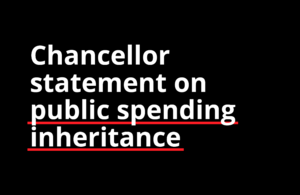Chancellor: I will take the difficult decisions to restore economic stability
Chancellor addresses House of Commons with a pledge to ‘restore economic stability’ after revealing £22 billion of unfunded pressures inherited from the previous Government.

- Findings of a Treasury spending audit reveal £22 billion of unfunded pledges inherited from the previous Government this year.
- Chancellor takes “difficult decisions” to find £5.5 billion of savings this year and £8.1 billion next year.
- A set of non-negotiable fiscal rules will be confirmed at Budget on 30th October, alongside further difficult decisions on tax and spending.
- Finalised departmental budgets for this financial year and the next will be confirmed in October and a multi-year Spending Review will conclude in Spring 2025 to embed mission-led government and transform public services.
Addressing the House of Commons today (Monday 29th July) the Chancellor pledged to ‘restore economic stability’ after revealing £22 billion of unfunded pressures inherited from the previous Government.
Findings from a Treasury audit commissioned by the Chancellor expose billions of pounds of unfunded commitments from the previous Government, including the Rwanda scheme, the Advanced British Standard and the New Hospital Programme.
The previous Government also failed to increase Departmental budgets to cover public sector pay settlements, which were £11-12 billion higher than accounted for at the last Spending review. All of which were made on top of pressures resulting from higher inflation, increased asylum costs and funding for Ukraine.
Taking immediate action, the Chancellor announced £5.5 billion of savings this year and £8.1 billion next year to tackle the overspend. She also commits to set out full fiscal plans, alongside a Spending Review, at the Budget on 30th October.
Chancellor of the Exchequer, Rachel Reeves said:
This is not the statement I wanted to give today, and these are not the decisions I wanted to make. But they are the right decisions in difficult circumstances.”
The difficult decisions taken by the Chancellor have secured savings including over £1 billion next year, rising to over £4 billion by 29/30 by not proceeding with the previous government’s unfunded adult social care charging reforms.
Around £1.5 billion will be saved per year by targeting Winter Fuel Payments meaning households with someone aged over State Pension age receiving Pension Credit, Universal Credit, Income Support, income-based Jobseeker’s Allowance and income-related Employment and Support Allowance will continue to receive Winter Fuel Payments. This will better target support for heating costs at those who need it.
Immediate savings include £800 million this year and £1.4 billion next year from scrapping the Rwanda migration partnership and scrapping retrospection of the Illegal Migration Act, £70 million this year by cancelling the Investment Opportunity Fund and other small projects, £185 million next year from cancelling the Advanced British Standard and £785 million next year from stopping unaffordable road and railway schemes. The Chancellor also announced a review of the underdelivering New Hospital Programme.
To provide certainty for public sector workers and help put an end to devastating strikes costing billions of pounds, the Chancellor accepted the independent Pay Review Body recommendations and confirm pay uplifts averaging 5.5% for public sector workers.
To ensure that no Government is faced with a spending cliff-edge like this again the Chancellor set out plans to ensure Spending Reviews are set every two years to cover a three-year period, with a one year overlap with the previous Spending Review, helping build in greater certainty and stability over public finances. Transparency over in year spending pressures will also be enhanced, with more information being provided to the OBR. In the House the Chancellor also re-committed to a single major fiscal event a year.
The Chancellor also outlined long-term plans to tackle unacceptably high levels of welfare fraud and error as well as addressing falling public sector productivity and a new Office of Value for Money. During her statement the Chancellor outlined next steps in delivering tax commitments from the manifesto, to provide taxpayers with certainty ahead of their final confirmation at the Budget.
This includes ending the VAT tax breaks for private schools from 1 January 2025 to help recruit 6,500 new teachers, as well as replacing the outdated non-domicile regime with a new internationally competitive residence-based regime.
As also set out in the manifesto, the Chancellor confirmed plans for the Energy Profits Levy to be extended one year to 31 March 2030, have its investment allowances tightened and to increase the rate of the levy by three percentage points to 38% from 1 November 2024.
A call for evidence confirming the government’s intention to take action on the carried interest loophole has also been published, as well as a commitment to update on policies at the Budget to help close the tax gap further.
Further details for all tax policies, including costings certified by the Office for Budget Responsibility, will be published at the Budget.
Further information:
- The Chancellor’s statement
- Other documents in relation to this statement
- Winter Fuel Payments are devolved in Scotland and Northern Ireland.
- Autumn Budget 2024 / Spending Review - Stakeholder Representation
Updates to this page
-
Link to the Autumn Budget 2024 - Stakeholder Representation survey added.
-
New links added to speech and collection.
-
First published.